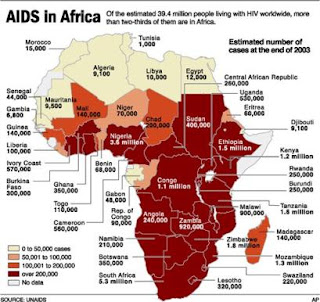Perhaps it should have beenobvious, but eliminating a death sentence gives back hope and optimism for thefuture and that leads directly to wealth accumulation. That it has become visible and dramatic has alot to do with the simple impact of retroviral therapy and its obviouseffectiveness.
I know one individual whowas diagnosed at the age of sixty and lucked out. As each improvement came alone he caught thewave in time to last to the next innovation. Today he is seventy five and is sporting a healthy immune system. He will die of old age and its normal deterioration. No one in the developed world faces even thattoday because the proper application is well understood and side effects arenow minimized.
Thus we have generalapplication underway in Africa and this reportof the economic payback should encourage governments to be proactive.
And yes we now see thelight at the end of the tunnel in which this disease becomes extinct.
Released: 12/1/2010 12:45 PM EST
Newswise — Two teams ofresearchers at UC San Diego and other U.S. and African universities and theWorld Bank have documented significant spillover benefits of a drug therapy tocombat AIDS symptoms and a novel prevention strategy that focuses on girls inSub-Saharan Africa, an area with two-thirds of the world’s HIV infections.
A recently publishedpaper in Public Economics documentsa dramatic “Lazarus effect” in AIDS-affected households in rural Kenya
“Most successful AIDSrelief initiatives have been lopsided in their focus on anti-retroviraltherapy, but behavioral dimensions of the epidemic are equally significant,”said Joshua Graff-Zivin, co-author of the study and associate professor ofeconomics at UC San Diego’s School of International Relations and PacificStudies (IR/PS). “Anti-retroviral therapy may be achieving much morefar-reaching impacts than just the medical benefits, and anti-retroviraltherapy may help the continent escape a much broader set of behavioral povertytraps that would otherwise arise from stratospheric HIV-prevalence rates.”
The study was supportedby a partnership of the U.S.
“This Lazarus effect,whereby those who had expected a swift decline and death are granted a newlease on life by treatment, suggests that without effective anti-retroviraltreatment, the epidemic may be having pervasive negative effects on people’swillingness to think long-term and to invest for the future,” Graff-Zivin said.“This study shows that effective treatment yields significant economicdividends such as improved capital investment. Based on our latest fieldresearch we also think anti-retroviral therapy enhances environmental stewardshipand a host of other positive effects as households switch from a sense ofhopelessness to planning for their long-term futures.”
In a separate studyconducted in the southern African nation of Malawi
Two dramaticallypositive results were measured:
* About 18 months afterthe program began, HIV prevalence among the participating schoolgirls was 60percent lower than the control group (1.2 percent vs. 3.0 percent).
* The prevalence of Herpes Simplex Virus type 2, the common cause of genitalherpes, was more than 75 percent lower among the girls participating in thestudy compared to a control group (0.7 percent vs. 3.0 percent).
“This study was thefirst rigorously estimated evidence that a behavioral intervention may havemeaningful effects on the trajectory of the HIV epidemic,” said Craig McIntosh,a co-author of the study and associate professor of economics at IR/PS.“Similar programs in Mexico, Brazil and Nicaragua have demonstrated efficacy inimproving school enrollment, learning or labor-market outcomes, but wesuspected that the conditional-cash-transfer approach could also have a strongimpact on the health of girls living in an epicenter of HIV infections.”
Theconditional-cash-transfer program virtually eliminated sexual relationshipsbetween teen-age girls and men over 25. “This is very important because thisapproach greatly reduces HIV transmission from an older demographic group to ayounger one, which could lead to the epidemic burning itself out,” McIntoshsaid. “This study shows how the lives of girls can be improved, vulnerablehouseholds can be protected, and spread of the HIV epidemic can besignificantly slowed.”
The study was supportedby the Global Development Network and the Bill and Melinda Gates Foundation.The research team included McIntosh; Sarah Baird, an assistant professor ofglobal health at George Washington University; Ephraim Chirwa, associateprofessor of economics at the University of Malawi, and Berk Özler, aneconomist with the World Bank.









No comments:
Post a Comment